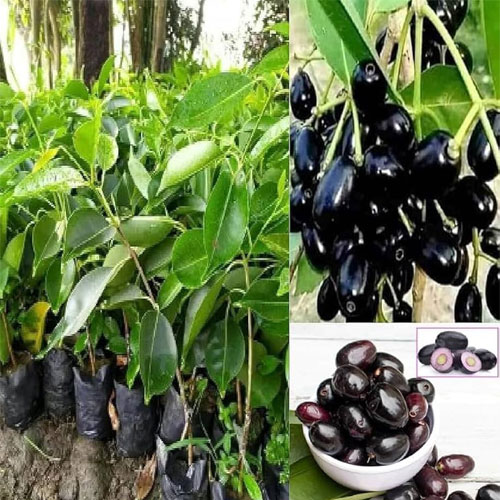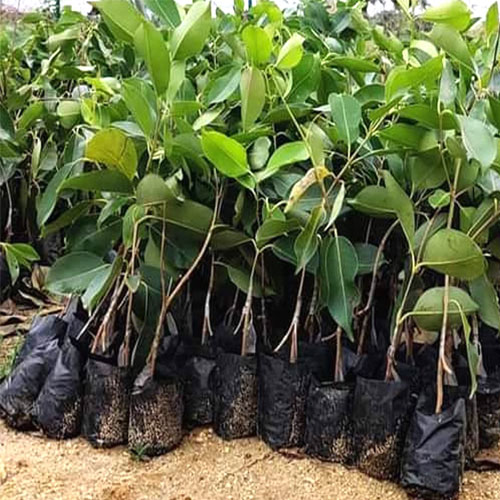The Thai Black Jamun Grafted Live Plant (Syzygium cumini) is an exotic tropical fruit tree prized for its large, sweet, seedless black fruits that are rich in antioxidants and vitamins. This premium grafted variety from Thailand is well-known for its early fruiting ability, high yield, and exceptional sweetness. The fruits are deep purple to black in color, soft, and juicy with a pleasant tang. Grown and grafted by Golden Hills Farm, this variety is perfect for Indian conditions and ideal for home gardens, terraces, and farms.
Type of Plant: Grafted Fruit Plant – Thai Black Jamun (Exotic Variety)
Scientific Name: Syzygium cumini
Germination Time: 10 – 15 days (for new shoots after planting)
Sunlight Requirements: 6 – 8 hours of direct sunlight daily
Where to Grow: Terrace gardens, backyards, or open fields
Growing Season: June – September (monsoon) or February – April (spring)
Soil Requirements: Loamy, well-drained soil enriched with compost
Plant Height: 1.5 – 2 feet (at dispatch)
Fertilizer Needs: Apply organic compost every 30–45 days for healthy fruiting
Life Span: Long-lived fruit tree (25+ years)
Ideal Growing Temperature: 22 °C – 35 °C
Blooming / Harvesting Time: Flowers in summer; fruits mature during rainy season
Maintenance Required: Low; pruning and organic feeding recommended
Watering Frequency: 2–3 times per week when young; weekly when mature
Ideal Grow Bag Size: 18 × 18 inches or larger


The Thai Black Jamun Grafted Plant adapts perfectly to India’s tropical and subtropical climates. The best planting seasons are monsoon (June – September) and spring (February – April). Once established, this grafted variety starts fruiting within 1–2 years, producing large, jet-black jamuns that are juicy, seedless, and naturally sweet — far superior to local varieties in flavor and size.
Use a large 18×18 inch grow bag or earthen pot with proper drainage. Fill with a mixture of garden soil, sand, and compost. Plant upright, cover roots gently, and water well. Keep under full sunlight for 6–8 hours daily. Feed with organic compost monthly and maintain moderate moisture.
Preparation: Prepare a 1×1×1 ft pit with compost and red soil.
Planting: Place the grafted plant upright, refill the pit, and press the soil lightly.
Watering: Water thoroughly after planting and maintain light moisture for 15 days.
Germination: Grafted plants establish quickly and start fruiting within 1–2 years.
Transplanting: Shift to open soil once roots develop fully.
Sunlight: Needs 6–8 hours of bright sunlight daily.
Soil: Loamy, fertile, and well-drained with organic compost.
Fertilization: Add cow dung or neem cake monthly.
Pruning: Trim after harvest to promote new growth.
Support & Spacing: Maintain 6 ft spacing between plants.
Pest Control: Use neem oil every 15 days to prevent aphids.
Disease Prevention: Avoid overwatering; ensure soil drainage.
Mulching: Apply dry leaves or straw to conserve moisture.
Harvesting: Fruits are ready when they turn dark black and shiny.
1. Apply Nutrient-Rich Fertilizers
When your plants begin flowering, use nutrient-rich fertilizers like Organic Bone Meal Powder or Vermicompost. This helps in boosting the bloom and enhances overall yield.
2. Use Organic Fertilizers
Feed your plants with organic fertilizers such as Cow Dung Manure or Neem Cake. Organic options promote healthy soil life.
3. Regular Feeding
Apply fertilizers every 20-25 days to ensure plants receive a steady supply of nutrients. Choose from various options like Cocopeat Compost for moisture retention.
The Thai Black Jamun Grafted Live Plant is a rare, exotic, and high-yielding tropical variety producing large, sweet, black jamuns with minimal seeds. Its fruits are rich in iron, vitamin C, and antioxidants, helping regulate blood sugar and improving immunity. The plant is early-fruiting, disease-resistant, and easy to grow in Indian climates, making it ideal for both home gardeners and orchard growers.
Produces large, sweet, seedless black jamuns.
Excellent source of antioxidants and vitamin C.
Helps control blood sugar naturally.
Grafted variety gives early fruiting and high yield.
Easy to grow in pots, terraces, or open soil.
Avoid overwatering; ensure soil drains well.
Keep under full sunlight for continuous growth.
Use organic compost; avoid chemical fertilizers.
Protect young plants from strong winds.
Do not transplant frequently once roots are established.
Problem: Yellowing leaves or stunted growth.
Solution: Improve drainage and apply organic manure.
Problem: Flowers dropping before fruiting.
Solution: Maintain consistent watering and adequate sunlight.
Problem: Pest attacks on new shoots.
Solution: Spray neem oil every 15 days to prevent damage.
Kaala Jamun, Black Java Plum, Thai Jamun, Neredu Pandu, Jambhul, Naval Pazham, Jamblang, Jambu Phal, Jambakka, Kala Jambu.
Q1: When does the Thai Black Jamun start fruiting?
👉 Usually within 1–2 years of planting.
Q2: Is it seedless?
👉 Most fruits are seedless or have very small, soft seeds.
Q3: Can it be grown in pots?
👉 Yes, it grows well in large terrace pots with full sunlight.
Q4: Is the fruit sweet?
👉 Yes, it has a naturally sweet and slightly tangy flavor.
Sign in now to receive a 5% instant discount on your first order when using code WELCOME. Begin your organic journey today!
By logging in, you're agreeing to our Terms of Service and Privacy Policy.
Mohan Krishnan
Golden Hills Farm se hamesha healthy aur rare plants milte hain.
Deepika Singh
Bahut accha plant, early fruiting expected hai.
Anand Pillai
Roots strong the aur koi damage nahi hua delivery ke samay.
Lakshmi Nair
Bahut fast delivery aur healthy jamun plant.
Vivek Raj
Thai Black Jamun Grafted Live Plant garden me bahut attractive lagta hai.
Arun Kumar
Plant healthy aur 100% live condition me deliver hua.
Gokul Raj
Plant ka fruit color dark black aur taste amazing hai.
Manoj Das
The Thai Black Jamun Grafted Live Plant arrived in perfect condition, well packed and healthy.
Sneha Patel
Bahut accha grafted jamun plant mila, stem thick aur healthy hai.
Rekha Iyer
Plant easily adapt ho gaya mere garden ke weather me.